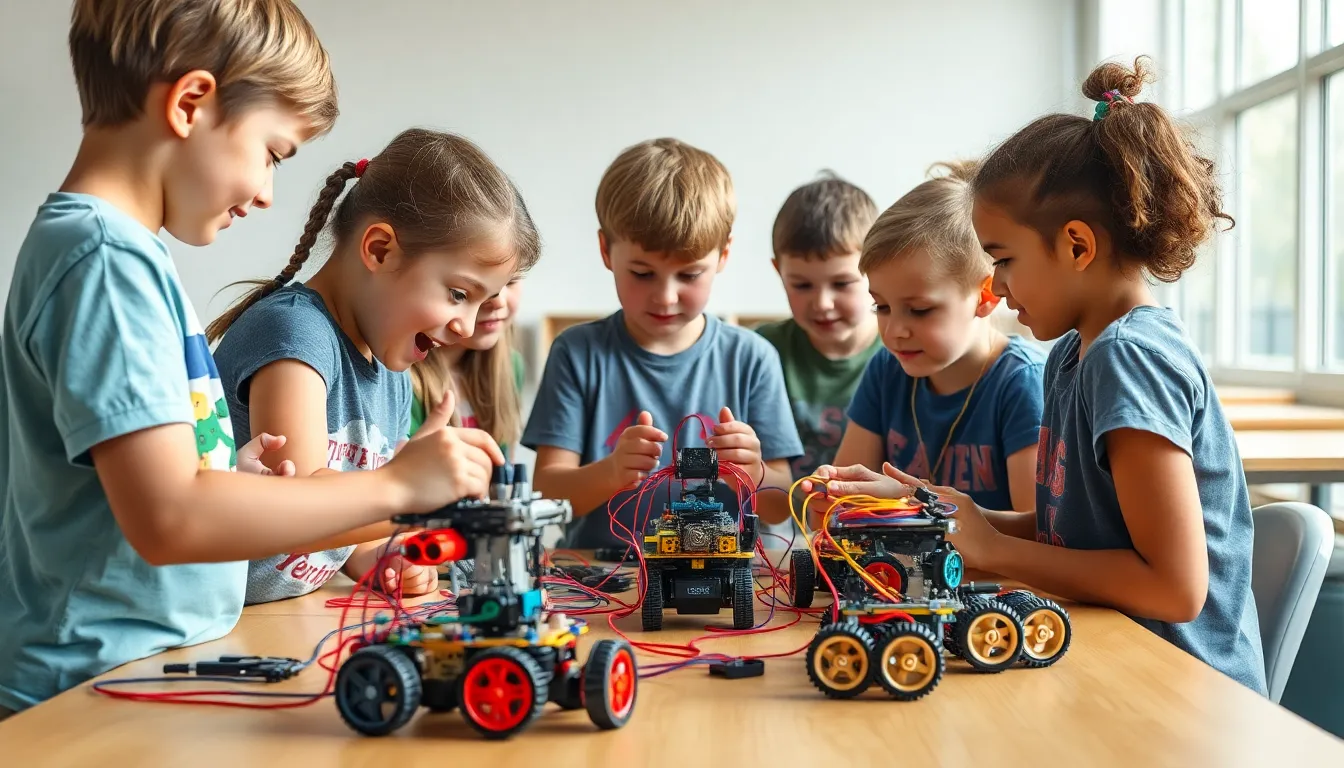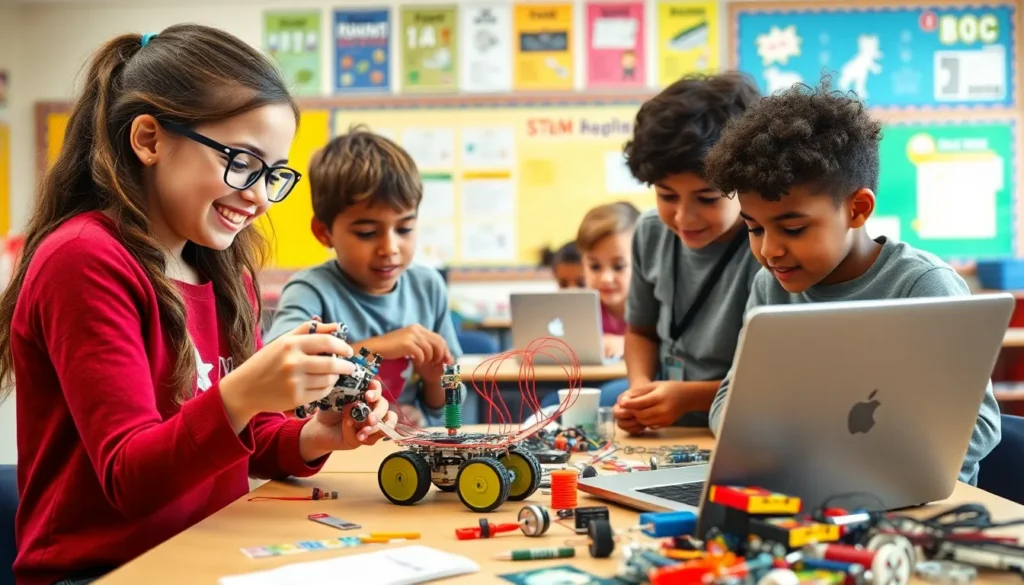Table of Contents
ToggleImagine a world where kids don lab coats instead of pajamas and trade video games for robotics kits. Welcome to the exciting realm of STEM camps, where science, technology, engineering, and math come to life in the most engaging way possible. These camps aren’t just about crunching numbers or memorizing formulas; they’re about sparking curiosity and igniting a passion for learning that lasts a lifetime.
Overview of Stem Camps
STEM camps provide an engaging way for children to explore science, technology, engineering, and math through hands-on activities. These camps immerse participants in projects and challenges that stimulate creativity and critical thinking.
What Are Stem Camps?
STEM camps offer immersive experiences where children dive into various fields of science, technology, engineering, and math. They typically involve engaging activities like robotics, coding, and experiments that encourage exploration. Participants work on team-based projects, which enhance collaboration skills. Moreover, these camps often blend education with fun, making complex topics more approachable for young learners.
Importance of Stem Education
STEM education plays a crucial role in preparing students for the future workforce. It fosters analytical thinking and problem-solving skills necessary in today’s job market. Exposure to STEM fields early enhances creativity and innovation, enabling students to tackle real-world challenges. Statistical data shows that careers in STEM fields are growing significantly, with job opportunities increasing by 10.5% from 2020 to 2030. Recognizing the importance of STEM education helps drive interest and investment in these essential skills.
Types of Stem Camps

STEM camps encompass various specialized programs designed to engage students in different aspects of science, technology, engineering, and math. Each type of camp targets specific interests, allowing participants to dive deeper into their chosen field.
Robotics Camps
Robotics camps focus on designing, building, and programming robots. Participants engage in hands-on activities, using kits to create functioning machines. Through these experiences, they grasp essential concepts in mechanics and electronics. Campers often collaborate in teams, enhancing their problem-solving skills. Exposure to robotics prepares students for potential careers in automation, artificial intelligence, and engineering.
Coding Camps
Coding camps encourage participants to learn programming languages through interactive projects. Students often develop their own apps or games, providing tangible results for their efforts. Learning to code fosters logical thinking and creativity, essential skills in today’s technology-driven landscape. Many coding camps also introduce concepts like web development and game design, broadening the participants’ understanding of the tech industry.
Science and Engineering Camps
Science and engineering camps immerse participants in experiments and projects that illustrate core scientific principles. These camps typically cover various topics, including chemistry, physics, and environmental science. Campers engage in hands-on explorations, providing real-world applications for theoretical concepts. Learning through experimentation supports critical thinking and analytical skills, essential for future academic pursuits and careers in STEM fields.
Benefits of Stem Camps
STEM camps offer numerous advantages for participants, contributing significantly to their educational development.
Enhancing Critical Thinking Skills
Critical thinking skills receive a substantial boost through engaging activities at STEM camps. Participants confront real-world problems that require analytical solutions. Exposure to concepts in science, technology, engineering, and math encourages campers to ask questions and explore various solutions. Campers develop reasoning abilities as they participate in hands-on experiments and projects. These skills translate into improved academic performance in school subjects. In a rapidly evolving job market, critical thinking remains a sought-after trait. Thus, STEM camps play a vital role in cultivating these essential cognitive abilities.
Encouraging Teamwork and Collaboration
Teamwork and collaboration thrive in the interactive environment of STEM camps. Campers work together to solve challenges, fostering communication and social skills. Participants learn to respect diverse perspectives while engaging in group activities. Collaboration enhances participants’ ability to share ideas and build on each other’s strengths. Group projects instill a sense of responsibility and accountability, as each camper contributes to the results. Such experiences prepare young learners for future endeavors in academic and professional settings. As teamwork becomes increasingly important in the modern workplace, skills honed at STEM camps become invaluable.
Choosing the Right Stem Camp
Selecting a STEM camp involves careful consideration of multiple factors to ensure a good fit. Parents and guardians should evaluate the camp’s curriculum and structure, looking for programs that provide hands-on experiences with science, technology, engineering, and math concepts. Additionally, consider the age group and skill level; aligning these can facilitate an engaging learning environment.
Factors to Consider
Location plays a significant role in decision-making. Proximity to home can influence logistics and convenience. Program duration also matters; options range from week-long sessions to month-long programs. Furthermore, instructor qualifications can affect the quality of learning. Investigating instructors with expertise in STEM fields can provide assurance of a robust educational experience.
Recommended Stem Camps
Several STEM camps excel in providing immersive experiences. Tech Trek offers robotics and coding sessions for students, integrating teamwork with hands-on projects. Camp Invention captivates young minds with science and engineering challenges, promoting innovation through creative problem-solving activities. Finally, Digital Media Academy immerses participants in tech-driven environments, allowing them to explore digital art and game design while honing their skills.
STEM camps play a vital role in shaping the future of young learners. By immersing them in hands-on experiences, these camps ignite a passion for science, technology, engineering, and math. Participants not only gain knowledge but also develop essential skills like critical thinking and teamwork.
As the demand for STEM professionals continues to rise, early exposure through these camps equips children with the tools they need to succeed. Choosing the right camp ensures that each child can thrive in an environment tailored to their interests and abilities. Investing in STEM education today will undoubtedly pave the way for a brighter tomorrow.







